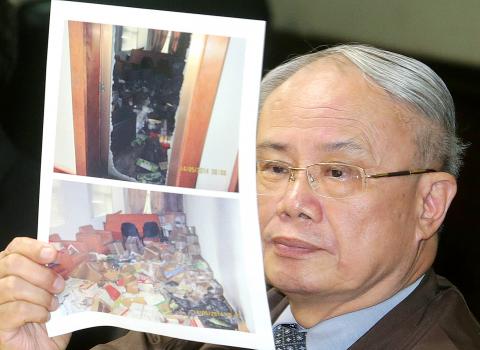Formosa Plastics Group (FPG, 台塑企業), the nation’s largest industrial conglomerate, yesterday said that anti-China protesters in Vietnam broke into the facilities of its division in Nhon Trach District, Dong Nai Province, on Tuesday, injuring one employee from Taiwan.
The protests were caused by China’s dispatch of an oil rig to a disputed area in the South China Sea 120km from Vietnam’s coast.
However, protesters on Tuesday either could not or did not differentiate between Taiwanese companies and Chinese ones, Hong Fu-yuan (洪福源), president of the group’s Vietnamese division, Formosa Industries Corp (台灣興業), said in Taipei yesterday.

Photo: CNA
About 300 protesters, some carrying steel bars and others on motorcycles, stormed Formosa Industries’ offices, factory and dormitory at 11:45pm on Tuesday. They stole or destroyed computer monitors and TV, as well as robbed employees of personal property, before leaving at about 4am, Hong said.
Formosa Plastics Group is one of the biggest foreign investors in Vietnam. Hong said Formosa Industries had halted its operations in Dong Nai and is assessing the damage. While major facilities were not affected, resuming operations will depend on whether the local government can offer the firm sufficient protection, he said.
“The situation was close to anarchy,” Hong said. “Since the Vietnamese government is incapable of protecting investors from abroad, we believe foreign investors will have to reconsider their future investments in the country.”
Asked about the company’s US$500 million capacity expansion plan for textile and plastics production in the area, Hong said it will re-evaluate the parts of the initiative that have not been initiated yet, without offering details.
Formosa Industries has no plan to repatriate its 200 Taiwanese employees because it is still too dangerous, he added.
Formosa Industries posts annual revenues of NT$25 billion (US$803.08 million) on average and employs 3,000 workers, Hong said.
Tire maker Cheng Shin Rubber Industrial Co (正新輪胎), which rents land from Formosa Industries in the area, said its premises were also attacked by anti-China protesters, causing it to shut its Vietnamese division down yesterday.
Cheng Shin is still assessing the damage at its Vietnamese unit, which produces 15,000 tires for motorcycles a year and posts annual revenue of NT$3 billion a year on average, or about 3 percent of the tire maker’s total revenue.
However, Advanced International Multitech Co (明安國際), which also rents land from Formosa Industries in the area to manufacture golf club heads and putters, is sending 30 of its Taiwanese staff home.
The golf equipment firm’s division in Vietnam, which generates 10 percent of its products, yesterday said it would use its Chinese plants to meet client orders.
Apparel maker Eclat Textile Co (儒鴻) also shut down five factories in southern Vietnam yesterday, but kept two in the north open.
Sales of Eclat’s Vietnamese division accounted for more than 50 percent of the company’s revenue of NT$18.14 billion last year, vice president Roger Lo (羅仁傑) said.
Eclat did not receive any report of damage at its factories, Lo said.
As for its capacity expansion drive in Nhon Trach, Lo said it will be completed by the end of this quarter as scheduled.

AGING: As of last month, people aged 65 or older accounted for 20.06 percent of the total population and the number of couples who got married fell by 18,685 from 2024 Taiwan has surpassed South Korea as the country least willing to have children, with an annual crude birthrate of 4.62 per 1,000 people, Ministry of the Interior data showed yesterday. The nation was previously ranked the second-lowest country in terms of total fertility rate, or the average number of children a woman has in her lifetime. However, South Korea’s fertility rate began to recover from 2023, with total fertility rate rising from 0.72 and estimated to reach 0.82 to 0.85 by last year, and the crude birthrate projected at 6.7 per 1,000 people. Japan’s crude birthrate was projected to fall below six,

US President Donald Trump in an interview with the New York Times published on Thursday said that “it’s up to” Chinese President Xi Jinping (習近平) what China does on Taiwan, but that he would be “very unhappy” with a change in the “status quo.” “He [Xi] considers it to be a part of China, and that’s up to him what he’s going to be doing, but I’ve expressed to him that I would be very unhappy if he did that, and I don’t think he’ll do that. I hope he doesn’t do that,” Trump said. Trump made the comments in the context

SELF-DEFENSE: Tokyo has accelerated its spending goal and its defense minister said the nation needs to discuss whether it should develop nuclear-powered submarines China is ramping up objections to what it sees as Japan’s desire to acquire nuclear weapons, despite Tokyo’s longstanding renunciation of such arms, deepening another fissure in the two neighbors’ increasingly tense ties. In what appears to be a concerted effort, China’s foreign and defense ministries issued statements on Thursday condemning alleged remilitarism efforts by Tokyo. The remarks came as two of the country’s top think tanks jointly issued a 29-page report framing actions by “right-wing forces” in Japan as posing a “serious threat” to world peace. While that report did not define “right-wing forces,” the Chinese Ministry of Foreign Affairs was

PREPAREDNESS: Given the difficulty of importing ammunition during wartime, the Ministry of National Defense said it would prioritize ‘coproduction’ partnerships A newly formed unit of the Marine Corps tasked with land-based security operations has recently replaced its aging, domestically produced rifles with more advanced, US-made M4A1 rifles, a source said yesterday. The unnamed source familiar with the matter said the First Security Battalion of the Marine Corps’ Air Defense and Base Guard Group has replaced its older T65K2 rifles, which have been in service since the late 1980s, with the newly received M4A1s. The source did not say exactly when the upgrade took place or how many M4A1s were issued to the battalion. The confirmation came after Chinese-language media reported